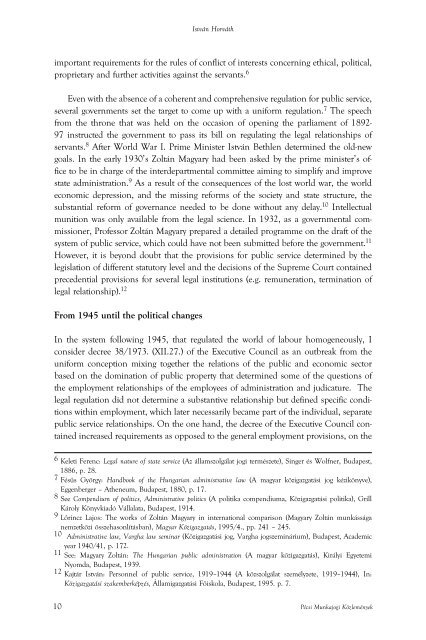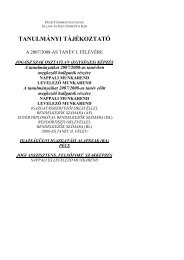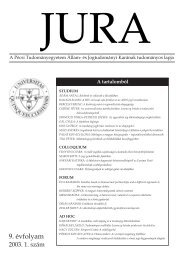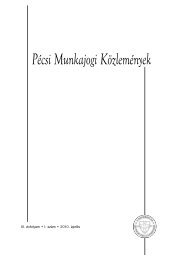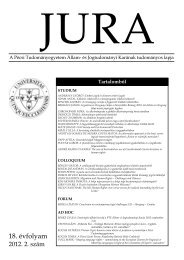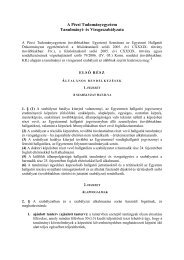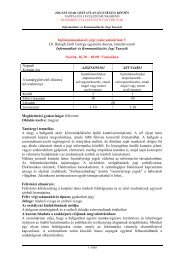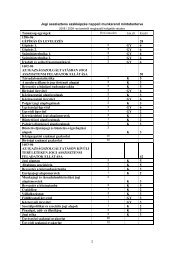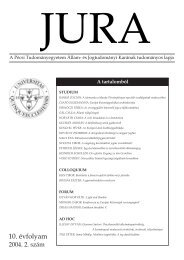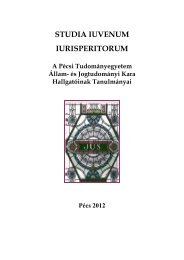Pécsi Munkajogi Közlemények - ICELL - ÃsszehasonlÃtó és Európai ...
Pécsi Munkajogi Közlemények - ICELL - ÃsszehasonlÃtó és Európai ...
Pécsi Munkajogi Közlemények - ICELL - ÃsszehasonlÃtó és Európai ...
You also want an ePaper? Increase the reach of your titles
YUMPU automatically turns print PDFs into web optimized ePapers that Google loves.
István Horváthimportant requirements for the rules of conflict of interests concerning ethical, political,proprietary and further activities against the servants. 6Even with the absence of a coherent and comprehensive regulation for public service,several governments set the target to come up with a uniform regulation. 7 The speechfrom the throne that was held on the occasion of opening the parliament of 1892-97 instructed the government to pass its bill on regulating the legal relationships ofservants. 8 After World War I. Prime Minister István Bethlen determined the old-newgoals. In the early 1930’s Zoltán Magyary had been asked by the prime minister’s officeto be in charge of the interdepartmental committee aiming to simplify and improvestate administration. 9 As a result of the consequences of the lost world war, the worldeconomic depression, and the missing reforms of the society and state structure, thesubstantial reform of governance needed to be done without any delay. 10 Intellectualmunition was only available from the legal science. In 1932, as a governmental commissioner,Professor Zoltán Magyary prepared a detailed programme on the draft of thesystem of public service, which could have not been submitted before the government. 11However, it is beyond doubt that the provisions for public service determined by thelegislation of different statutory level and the decisions of the Supreme Court containedprecedential provisions for several legal institutions (e.g. remuneration, termination oflegal relationship). 12From 1945 until the political changesIn the system following 1945, that regulated the world of labour homogeneously, Iconsider decree 38/1973. (XII.27.) of the Executive Council as an outbreak from theuniform conception mixing together the relations of the public and economic sectorbased on the domination of public property that determined some of the questions ofthe employment relationships of the employees of administration and judicature. Thelegal regulation did not determine a substantive relationship but defined specific conditionswithin employment, which later necessarily became part of the individual, separatepublic service relationships. On the one hand, the decree of the Executive Council containedincreased requirements as opposed to the general employment provisions, on the6 Keleti Ferenc: Legal nature of state service (Az államszolgálat jogi természete), Singer és Wolfner, Budapest,1886, p. 28.7 Fésûs György: Handbook of the Hungarian administrative law (A magyar közigazgatási jog kézikönyve),Eggenberger – Atheneum, Budapest, 1880, p. 17.8 See Compendium of politics, Administrative politics (A politika compendiuma, Közigazgatási politika), GrillKároly Könyvkiadó Vállalata, Budapest, 1914.9 Lôrincz Lajos: The works of Zoltán Magyary in international comparison (Magyary Zoltán munkásságanemzetközi összehasonlításban), Magyar Közigazgatás, 1995/4., pp. 241 – 245.10 Administrative law, Vargha law seminar (Közigazgatási jog, Vargha jogszeminárium), Budapest, Academicyear 1940/41, p. 172.11 See: Magyary Zoltán: The Hungarian public administration (A magyar közigazgatás), Királyi EgyetemiNyomda, Budapest, 1939.12 Kajtár István: Personnel of public service, 1919–1944 (A közszolgálat személyzete, 1919–1944), In:Közigazgatási szakemberképzés, Államigazgatási Fôiskola, Budapest, 1995. p. 7.10 Pécsi <strong>Munkajogi</strong> Közlemények01_horvath.indd 1010/7/08 5:12:49 PM


